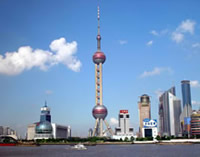|
|


ADVERTISEMENT
Buy Your own advertising
spaces!
.
Download Adobe Acrobat Reader to open [PDF] files.
Recent Visitors
Beijing's Fad of US Dollar Bashing
2009. 7 July
(chinastakes.com) China has become the world’s main battlefield in the challenge to the dominance of the US dollar. At a recent global think tank summit held in Beijing by the China Center for International Economic Exchanges, China’s official think tank, voices for “international currency”, and “global supervision” sounded frequently, and some scholars proposed a special global currency meeting during the World Expo in 2010.
“The world’s economic organizations are globalized, while political organizations are regional, or at state level,” stated the almost 90-year-old former US Secretary of State Henry Kissinger, pointing out a basic world contradiction at the meeting.
Robert Mundell, known as the “father of euro,” said there was no doubt that all needed a single world currency.
A world currency would be the same as a super-sovereign currency. Zhou Xiaochun, governor of China’s central bank raised the idea of super-sovereign currency in March this year, a direct challenge to the dominance of USD as the world’s reserve currency.
Mundell said global politicians were constantly discussing a single-currency mechanism, and the time was coming to realize a globalized monetary system. Mundell has long advocated a world currency.
Many Chinese decision makers and economists think the current international monetary system dominated by the USD is the root of the crisis and needs a reform, a position that has some international consensus. People think differently, however, about how it should be reformed. Some think the international monetary system should be more diversified and more currencies should be involved in the system, while others say a global currency or super-sovereign currency should be established, issued and managed by the IMF or a newly established global central bank.
Vice-Chancellor Lawrence Lau of the Chinese University of Hong Kong contemplated the difference: “Shall we establish a single international reserve currency, or establish a diversified international reserve currency? Can we establish a super-sovereign currency?”
Lau analyzed several possible candidates for a super-sovereign reserve currency. Although many people prefer gold, Lau said the gold reserve is too low to satisfy a developing currency demand. As reserve currencies, the USD and euro are comparatively stable, and some think they can be combined into one currency. Whether this idea is feasible is an unknown.
Mundell once suggested combining the USD, euro, and yen into a “DEY,” and making that a global currency. Recently he has said the RMB and pound would have to be added into the mix.
As for Zhou Xiaochuan’s idea to develop the IMF’s SDR into a super-sovereign currency, Lau said while the euro was also a super-sovereign currency, and European taxes were calculated in euros, we couldn’t pay tax or buy a hamburger with SDR, for SDR was only a currency concept, and could not be used in daily life.
“It is a new problem whether there should even be a international currency. Which international organization should issue and supervise this currency?” he said.
Former US Senator Adlai Stevenson suggested the establishment of a new IMF to supervise the global monetary market.
Jeffrey Sachs, director of the Earth Institute at Columbia University, said to solve the crisis, we need to reform the international monetary system and the USD should no longer be the world’s only reserve currency.
Xiao Geng, a professor with Tsinghua University, thinks the root of global systemic risk comes from the lack of supervision over central banks. “We should learn from the WTO. It has been successful because it has restrained the rights of its members to formulate disparate trade policies. If a country wants to cut tariffs charged to one country, it has to cut it for all countries. This has guaranteed a stable global free trade environment.” Xiao Geng said all countries should be required to transfer some of their rights in monetary management to an international organization.
Marc Uzan, Executive Director of the Reinventing Bretton Woods Committee, said “I think we should rebuild a new Bretton Woods system. Professor Mundell supports my idea. We’re going to organize a global currency meeting, which is to lay a foundation for a global currency, during the 2010 World Expo in Shanghai.
Even while challenging the USD, however, Chinese decision makers are still uncertain whether the establishment of a global currency will meet China’s interests. Zhou Xiaochuan’s idea to establish a super-sovereign currency is fashionable, but in China the answer to the problem has not been cornered.
Source:http://www.chinastakes.com

